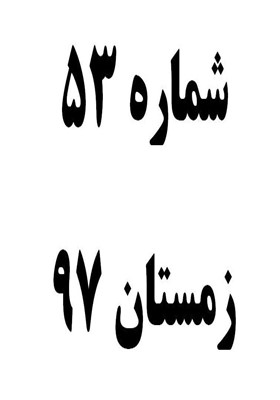بررسی چگونگی ایجاد معارف نوین در بلوچستان و سیر عملکرد آن در دوره پهلوی اول
محورهای موضوعی : مباحث معرفتی و روش شناختی و تاریخ پژوهیعلی نادریان فر 1 , علیرضا ابطحی 2 , سهیلا ترابی فارسانی 3 *
1 - گروه تاریخ، واحد نجفآباد، دانشگاه آزاد اسلامی، نجفآباد، ایران
2 - عضو هیأت علمی
3 - عضو هیات علمی
کلید واژه: فرهنگ, رضاشاه, اصلاحات, واژگان کلیدی: بلوچستان, معارف نوین,
چکیده مقاله :
چکیده بلوچستان تا قبل از سال 1307 ه. ش از نهضت فرهنگی مملکت بهره چندانی نداشت و آموزش اندک و محدود بود، دوره پهلوی اول در تاریخ سیاسی، اقتصادی، اجتماعی و فرهنگی بلوچستان حائز اهمیت زیادی است. به نظر میرسد آغاز روند پیدایش معارف نوین در بلوچستان به دوره پهلوی اول برمیگردد. اینکه معارف و آموزش کودکان بلوچ چگونه آغاز و چه مسیری را در دوره پهلوی اول طی نمود سؤال اصلی این پژوهش است، بر این اساس با توجه به اهمیت موضوع، در این تحقیق تلاش میگردد به روش تاریخی و به شیوه توصیفی و تحلیلی و با استفاده از منابع کتابخانهای و اسناد مراکز سازمان اسناد و کتابخانه ملی ایران مورد واکاوی و پژوهش قرار گیرد. یافتههای تحقیق حاکی از آن است که پس از عملیات قشون در بلوچستان دولت توجه خود را معطوف به گسترش تحولات فرهنگی نمود و در این زمینه اقداماتی نظیر دایر نمودن اداره فرهنگ و معارف، تأسیس مدارس شبانهروزی در شهرستانهای خاش، ایرانشهر، سراوان و زاهدان صورت گرفت. به نظرمی رسد حضور نظامیان در بلوچستان در گسترش و توسعه مدارس مؤثر بوده است از طرفی دیگر، باوجود اقدامات صورت گرفته در این زمینه، عدم اختصاص بودجه کافی و پرداخت بهموقع حقوق معلمان در مدارس تازه تأسیس، عدم وجود راههای مواصلاتی مناسب و عدم توجه کافی دولتمردان در دولتهای مختلف به امور فرهنگی بهعنوان مهمترین عوامل اصلی رکود و گسترش آموزش نوین در این دوره بهحساب میآید.
Abstract The Iranian Balochistan province was deprived of the country's cultural movement until 1928, and education was scarce. The era of the First Pahlavi king holds a special place in political, economic, social, and cultural history of this province. It seems the emergence of modern sciences in Balochistan took place in this period. The main question of this study involves the examination of the beginning and developments of education for Baloch children during Reza Shah's rule. Considering the sensitivity of the subject, a historical method using a descriptive-analytical design was employed; a desk study was carried out and documents of Iranian archives organizations and National Library of Iran were studied and analyzed. The results indicate that after the Ghoshun Operation (a military operation in 1928) in Balochistan, the government focused on expanding cultural developments through projects such as the establishment of the Department of Culture and Education and establishment of boarding schools in Khash, Iranshahr, Saravan and Zahedan counties. It appears that the military presence helped the expansion and growth of schools in Balochistan. On the other hand, many factors, such as insufficient budgetary allocations, untimely payment of wages to the teachers of newly founded schools, poor road conditions, and negligence of some politicians in cultural matters, contributed to the ups and downs of the modern education during this period.
_||_

